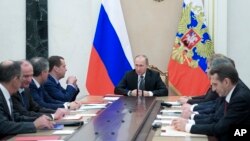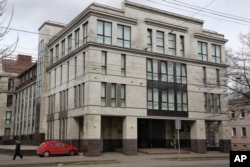Russian President Vladimir Putin is single-handedly trying to undermine democracy in the United States and Europe and rupture their decades-old NATO alliance by meddling in their elections, foreign affairs analysts and Estonia's former president told a congressional hearing Thursday in Washington.
One of the experts, Peter Doran, executive vice president of the Center for European Policy Analysis, a group promoting closer ties between central and eastern European countries and the United States, said U.S. lawmakers "should have no doubt, Russia is a rival to the United States."
Doran declared, “The Russian government is sharpening its use of state-sponsored propaganda against Western democracies. This puts democratic states and NATO at risk. The strategic aims of the Russian government are fundamentally incompatible with American interests in Europe."
Doran added, "Russia wants to establish a sphere of privileged influence in Europe and to do so, [it] must weaken America’s links to our allies, divide NATO and, if necessary, use force."
Repeating President Donald Trump's signature campaign slogan, Doran said, "I think it is very obvious that Putin does not want to 'make America great again.' In fact, Putin has the opposite goal, however our allies do. Allies like front-line states, the Baltic states, Poland and others, neighbors of Russia, they actually want us to succeed. Russia does not [want them to]."
Former Estonian president Toomas Hendrik Ilves told the House Foreign Affairs Committee that Putin "in all cases” wants "anti-European Union, anti-NATO forces" to win European elections in Germany, France, Italy and the Netherlands this year.
"The Dutch," Ilves said, "are so afraid" of Russian attacks on their electronic voting that the Netherlands has "gone back to paper balloting because they are afraid of what might happen."
‘Our democracy is being tested’
The U.S. intelligence community has concluded that Putin tried to interfere in November's U.S. presidential election with cyberattacks. Now, U.S. investigators and several congressional panels are probing the details behind the findings of the Central Intelligence Agency and examining contacts Trump aides have had with Russian officials.
Moscow's cyberattacks targeted the computer of Hillary Clinton's campaign chief, John Podesta, with the anti-secrecy group WikiLeaks subsequently releasing thousands of his emails in the weeks before the election that showed embarrassing, behind-the-scenes efforts by Democratic operatives trying to help Clinton win the party's presidential nomination before she ultimately lost to Trump.
Lincoln Bloomfield, a former assistant U.S. secretary of state for political military affairs, told the congressional panel that the overall consequences of the Russian interference in the election have yet to be determined.
"But it's very important to realize that our democracy is being tested," he said.
Daniel Baer, a former U.S. representative to the Organization for Security and Cooperation in Europe, said it is possible to track Russian disinformation campaigns aimed at Western democracies from Moscow's intelligence agencies through its propaganda arms "to a set of intermediaries disguised as independent sources."
He said purported news accounts that appeared in the United States last year might have described themselves in a way to "legitimize and make them attractive to target audiences. For example, those targeting Trump supporters may have, 'Make America Great Again,' or 'Christian, patriot, USA' in their profiles. Never mind that they might in fact be sitting in a troll factory in St. Petersburg."
Baer said the stories that started in Russia were "then amplified through technical means or bots that send many thousands of tweets with the same false stories accompanied by hashtags."
He said the "burst of activity puts the hashtags on Twitter’s trending list and then then the story is picked up by genuine supporters of a candidate or cause, who share it on Twitter or Facebook. Little does the person in Hamilton, New Jersey, or Brea, California, know that what they just shared by their friends and family is junk that was written by a Russian agent.”





